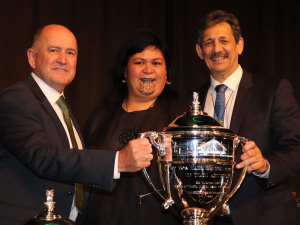Fruit fly discovery puts growers, exporters on edge
Fruit growers and exporters are worried following the discovery of a male Queensland fruit fly in Auckland this week.
 Hort NZ chair Barry O’Neill; Māori Development Minister Nania Mahuta and Ahuwhenua Trophy committee chair Kingi Smiler at the unveiling of the new hort trophy at last year’s Hort NZ conference.
Hort NZ chair Barry O’Neill; Māori Development Minister Nania Mahuta and Ahuwhenua Trophy committee chair Kingi Smiler at the unveiling of the new hort trophy at last year’s Hort NZ conference.
Three vastly different kiwifruit orchards make up the finalists in the inaugural Ahuwhenua Trophy competition for the top horticultural enterprise in the country.
The finalists were announced at a function at Parliament recently by the Minister for Māori Development, the Nanaia Mahuta and attended by politicians, diplomats, agribusiness and Maori leaders and
The three finalists are:
Hineora Orchard, Te Kaha 15B Ahu Whenua Trust, a small kiwifruit block located in the Eastern Bay of Plenty township of Te Kaha, 65km east of Ōpōtiki.
Otama Marere at Paengaroa, near the Bay of Plenty town of Te Puke, which grow a mixture of Green, SunGold and organic kiwifruit as well as avocados.
Ngai Tukairangi Trust, which is a large kiwifruit operation with one of its orchards, based at Matapihi, just a few kilometres from the centre of Tauranga city.
This is the first time in the 87-year history of the competition that the trophy has been open to horticulturalists. Previously it’s been restricted to sheep and beef and dairy farmers. However, a new trophy, similar to the other two has been manufactured and will be presented to the winner at an awards function in Tauranga at the end of May.
The Ahuwhenua Trophy is the most prestigious award for excellence in Māori farming and was inaugurated 87 years ago by the visionary Māori leader, Sir Apirana Ngata and the Governor General at the time, Lord Bledisloe. The objective is to encourage Māori farmers to improve their land and their overall farming position with an emphasis on sustainability.
On a three-year rotational basis, the trophy is competed for by Māori farmers in the sheep and beef, horticulture and dairy sectors.
Chairman of the Ahuwhenua Trophy management committee, Kingi Smiler, which organises the competition, says it is exciting to see such a positive response from Māori in the horticultural sector. He says the high calibre of all the entrants – in particular the finalists – highlights the contribution that Māori are making in the sector.
Smiler says in the last 20 years, the horticulture sector in New Zealand has become one of the stars of the New Zealand primary sector economy and it is pleasing to see that Māori have been an integral part of that growth.
“Since the inception of this competition we have seen what our sheep and beef and dairy farmers can do and now it is great to have the opportunity to showcase the excellence of our horticulturalists,” he told Hort News.
Smiler says while the sector is now basking in its success, the industry has been through hard times – especially the kiwifruit sector, which had to deal with PSA which significantly impacted on the industry.
“What we see in our finalists in 2020 is a unique combination of vision, resilience, innovation good governance, smart management and a commitment to their people,” he says. “They should be proud of their achievements and we are proud of them.”
Registrations are now open for the 2026 Ruralco Golf Classic, with all proceeds from the event set to support the Mid Canterbury Rural Support Trust.
Mating wrapped up last month at the across-breed Beef Progeny Test on Pāmu’s Kepler Farm in Manapouri.
Libby Judson is a keeper of memories from an age gone by. Tim Fulton tells her story.
A New Zealand-first native tree study has highlighted the Bioeconomy Science Institute's position as a forestry research leader.
Hemp fibre processor Rubisco is relocating its core processing facility to Ashburton as part of a $20-$30 million expansion to leverage what it says is an accelerating global demand for sustainable and renewable fibres.
Tradition meets some of the latest in technology at the 2026 East Coast Farming Expo.

OPINION: If the hand-wringing, cravat and bow-tie wearing commentariat of a left-leaning persuasion had any influence on global markets, we'd…
OPINION: With Winston Peters playing politics with the PM's Indian FTA, all eyes will be on Labour who have the…